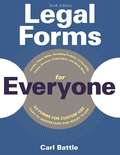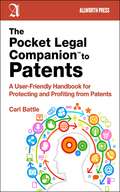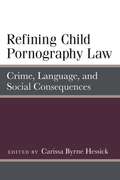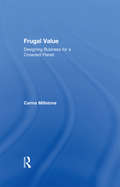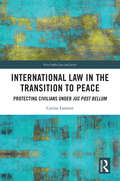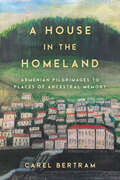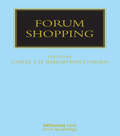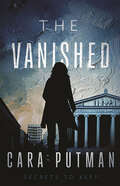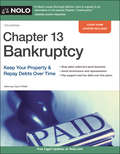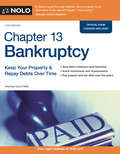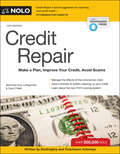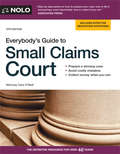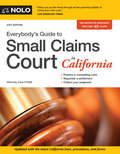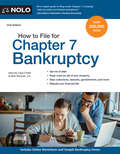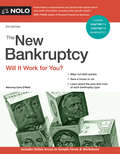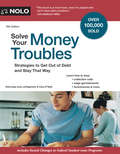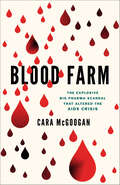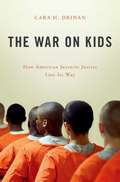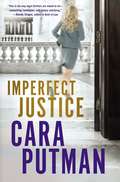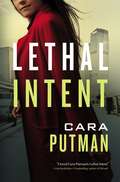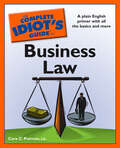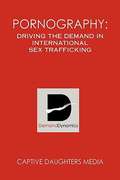- Table View
- List View
Legal Forms for Everyone: Leases, Home Sales, Avoiding Probate, Living Wills, Trusts, Divorce, Copyrights, and Much More (Legal Forms For Everyone Ser.)
by Carl BattleLegal Forms for Everyone is the ultimate self-help legal guide that will save hours of research time and money in legal fees. Written by an experienced attorney, this book is complete with the most commonly needed, ready-to-use legal forms and precise instructions and checklists on how to use them, as well as advice about when you should hire an attorney. In addition, all the forms are online on a supplemental website to aid in customizing for individual needs. Readers will find forms and advice for a variety of legal situations, including preparing a will, avoiding probate, buying and selling real estate, handling divorce or separation, getting a new name, copyrights and trademarks, bankruptcy, and so much more. However, due to the ever-evolving legal system and the development of new technologies, Carl Battle has added to this new edition such changes as:How to protect against credit fraud, identity theft, and internet fraudHow to navigate new electronic filing systems for copyrights, trademarks, and patentsUpdated information in filing fees, exemptions, and forms for filing for bankruptcyThe latest information on filing for patentsLegal Forms for Everyone is a comprehensive tool for getting in and out of legal situations without having to pay for that costly attorney.
The Pocket Legal Companion to Patents: A Friendly Guide to Protecting and Profiting from Patents
by Carl BattleMany great ideas fail because the inventors do not take the appropriate steps to protect, promote, and profit from their ideas. This friendly guide will walk you through everything that needs to be done before you can expect to realize financial gain from your invention.Experienced patent attorney Carl W. Battle provides methods for commercializing your invention, sources of information and assistance, and helpful guidelines for obtaining a US patent on your idea. Specific topics include:Using patent attorneys and agents Dealing with invention brokers and promotion firmsMaintaining confidentiality of your ideas Obtaining foreign patent rightsEnforcing your patent against infringementLicensing opportunitiesAnd much more This invaluable handbook also offers information that can assist in the selection of an attorney or patent agent, and will help you to get involved and monitor the patent and marketing process. Finally, easy-to-use forms and step-by-step instructions give you the option of saving money by handling the patenting and commercializing processes without hiring a patent attorney or invention broker.If you have an idea for an invention that could improve productivity, create jobs, or solve some long-standing problem, then pick up this Pocket Legal CompanionTM and learn how to maximize your profits.
Strange Neighbors: The Role of States in Immigration Policy (Citizenship and Migration in the Americas #6)
by Carissa Byrne Hessick and Gabriel J. ChinSince its founding, the U.S. has struggled withissues of federalism and states’ rights. In almost every area of law, fromabortion to zoning, conflicts arise between the states and the federalgovernment over which entity is best suited to create and enforce laws. In thelast decade, immigration has been on the front lines of this debate, withstates such as Arizona taking an extremely assertive role in policingimmigrants within their borders. While Arizona and its notorious SB 1070 is themost visible example of states claiming expanded responsibility to make andenforce immigration law, it is far from alone. An ordinance inHazelton, Pennsylvania prohibited landlords from renting to the undocumented. Severalstates have introduced legislation to deny citizenship to babies who are bornto parents who are in the United States without authorization. Other stateshave also enacted legislation aimed at driving out unauthorized migrants.Strange Neighbors explores the complicated and complicating roleof the states in immigration policy and enforcement, including voices from bothsides of the debate. While many contributors point to the dangers inherent instate regulation of immigration policy, at least two support it, while othersoffer empirically-based examinations of state efforts to regulate immigrationwithin their borders, pointing to wide, state-by-state disparities inlocally-administered immigration policies and laws. Ultimately, the book offersan extremely timely, thorough, and spirited discussion on an issue that willcontinue to dominate state and federal legislatures for years to come.
Refining Child Pornography Law: Crime, Language, and Social Consequences
by Carissa Byrne HessickThe legal definition of child pornography is, at best, unclear. In part because of this ambiguity and in part because of the nature of the crime itself, the prosecution and sentencing of perpetrators, the protection of and restitution for victims, and the means for preventing repeat offenses are deeply controversial. In Refining Child Pornography Law, experts in law, sociology, and social work examine child pornography law and its consequences in an effort to clarify the questions and begin to formulate answers. Focusing on the roles of language and crime definition, the contributors discuss the increasing visibility child pornography plays in the national conversation about child safety, and present a range of views regarding the punishment of those who produce, distribute, and possess materials that may be considered child pornography.
Frugal Value: Designing Business for a Crowded Planet
by Carina MillstoneWe live in unprecedented times. Climate change and ecosystem collapse are altering our world beyond recognition, and a growing global population is exacerbating the pressure on the resources that power our economies. How should the private sector respond to the new risks and uncertainties of our Crowded Planet? Frugal Value contests the notion that companies can rise to the great challenges of our time by adopting so-called 'sustainable business' practices. Instead, the acute ecological crisis requires an all-round rethink of what business does, and how it does it. This book explores what business responsibility looks like today, and how it could be put into practice through far-reaching changes to companies, ranging from new approaches to product design and business models to reconfiguration of operations and innovative ownership structures. Frugal Value provides practitioners and scholars with the perspective and tools they need to design companies that help drive the socio-economic changes so urgently required for a sustainable and just world.
International Law in the Transition to Peace: Protecting Civilians under jus post bellum (Post-Conflict Law and Justice)
by Carina LamontThis book proposes a normative framework specifically designed for the complex and legally uncertain time period between armed conflicts and peace. As such, it contributes both to the furthering of a jus post bellum framework, and to enhanced legal clarity in complex and legally uncertain environments. This, in turn, contributes to strengthened protection engagements, and thus to improved prospects of enabling sustainable peace and security in both national and international perspectives. The book offers a novel but persuasive argument for a legal framework specific for transitional environments. Such legal framework, it is argued, is warranted in order to enable legal clarity to contemporary and outstanding legal issues, as well as to furthering peace efforts in complex environments. The legal framework suggested proposes a dividing line between applicable legal frameworks that, it is submitted, enhances both legal clarity on protection engagements and the quest for sustainable peace. The framework proposed is founded on a legal analysis of the protective nature and function of law. It thus provides a rare but important perspective on law that is of value in the quest for sustainable peace and security. The research draws uniquely on both contemporary legal debates, and on peace and conflict research. It does so in order to enable legal analysis that is both legally sound, as well as appropriate and adequate in today’s peace and security realities. The book provides a valuable resource for academics, researchers and policy-makers in the areas of Public International Law, International Humanitarian Law, International Human Rights Law, (the law of) Peace Operations, and Peace and Security Studies.
Rethinking the Law School
by Carel StolkerLaw, by its very nature, tends to think locally, not globally. This book has a broader scope in terms of the range of nations and offers a succinct journey through law schools on different continents and subject matters. It covers education, research, impact and societal outreach, and governance. It illustrates that law schools throughout the world have much in common in terms of values, duties, challenges, ambitions and hopes. It provides insights into these aspirations, whilst presenting a thought provoking discussion for a more global agenda on the future of law schools. Written from the perspective of a former dean, the book offers a unique understanding of the challenges facing legal education and research.
A House in the Homeland: Armenian Pilgrimages to Places of Ancestral Memory (Worlding the Middle East)
by Carel BertramA powerful examination of soulful journeys made to recover memory and recuperate stolen pasts in the face of unspeakable histories. Survivors of the Armenian Genocide of 1915 took refuge across the globe. Traumatized by unspeakable brutalities, the idea of returning to their homeland was unthinkable. But decades later, some children and grandchildren felt compelled to travel back, having heard stories of family wholeness in beloved homes and of cherished ancestral towns and villages once in Ottoman Armenia, today in the Republic of Turkey. Hoping to satisfy spiritual yearnings, this new generation called themselves pilgrims—and their journeys, pilgrimages. Carel Bertram joined scores of these pilgrims on over a dozen pilgrimages, and amassed accounts from hundreds more who made these journeys. In telling their stories, A House in the Homeland documents how pilgrims encountered the ancestral house, village, or town as both real and metaphorical centerpieces of family history. Bertram recounts the moving, restorative connections pilgrims made, and illuminates how the ancestral house, as a spiritual place, offers an opening to a wellspring of humanity in sites that might otherwise be defined solely by tragic loss. As an exploration of the powerful links between memory and place, house and homeland, rupture and continuity, these Armenian stories reflect the resilience of diaspora in the face of the savage reaches of trauma, separation, and exile in ways that each of us, whatever our history, can recognize.
Forum Shopping
by Carel Baron van LyndenThis reference book, arranged alphabetically by country, describes how to found jurisdiction in over 20 jurisdictions. A questionnaire-based analysis ensures consistent headings are used throughout to allow cross-referencing and points of comparison between the various jurisdictions covered. Despite the existence of various international conventions designed to ensure uniformity of approach, significant differences in the laws of various countries exist which make it possible to create jurisdiction in one country which is not possible elsewhere. This reference book, arranged alphabetically by country, describes in a clear but concise manner how to found jurisdiction in over 20 jurisdictions. A questionnaire-based analysis ensures consistent headings are used throughout to allow easy cross-referencing and points of comparison between the various jurisdictions covered.
The Vanished: A Novel
by Cara Putman"Putman's legal expertise shines in this compelling and intricately plotted romantic suspense. Highly recommended!" --Colleen Coble, USA Today best-selling author Janae Simmons left the small town of Kedgewick, Virginia, ten years ago to pursue her legal career and never looked back--until a professional mistake leads her to her grandmother's historic carriage house and to the town where her past threatens to find her. The quiet streets echo with her grandfather's sterling reputation, one that conflicts with fresh questions that claw at Janae, launching her on a reluctant journey to unearth his secrets. When her new job at a local law firm doesn't live up to expectations, she wonders if coming home was the right decision. Carter Montgomery starts his art preservation career with the only job he can get--director at the Elliott Museum of Art. At least Kedgewick is a nice enough town to provide him and his nephew with a safe place to grieve the loss of Carter's sister. But Carter's calm days disappear when an elderly woman claims two paintings in the museum's collection were stolen from her family during World War II. Carter enlists Janae's help to unravel the legal labyrinth of art ownership, and the peaceful facade of Kedgewick morphs into a hot bed of secrets. When an attorney turns up dead and Janae uncovers another painting, what began as a simple legal issue spirals into a race against time. As the web of intrigue tightens, the duo must confront a looming question: What dark truths lie beneath the surface, waiting to be exposed? "Cara Putman has once again created an exciting cast of characters. I was immediately drawn in by Janae and Carter's unique chemistry. This is one story you don't want to miss." --Rebecca Hemlock, award-winning author of Fury in the Shadows
Chapter 13 Bankruptcy: Keep Your Property & Repay Debts Over Time
by Cara O'NeillStop creditors. Get more time to pay. Chapter 13 bankruptcy offers unique debt solutions not available in Chapter 7 bankruptcy. Yes, you’ll pay into a repayment plan. But your money will go toward the debts that matter most—like your mortgage, car loan, support obligations, and taxes. Remaining debts, such as credit card balances, medical bills, and utility bills, usually get only a fraction of what you owe. Some of Chapter 13 bankruptcy’s other features include allowing filers to: keep all property avoid foreclosure and vehicle repossession pay the fair market value for a car, and stop lawsuits, wage garnishments, and bank levies. Here, you’ll find clear explanations of the Chapter 13 process to help you: decide if Chapter 13 is your best option estimate your monthly plan payment, and find and work effectively with the right lawyer. This revised edition covers all the latest changes in bankruptcy law, including updated exemption tables for every state, and explains how to use the new official bankruptcy forms.
Chapter 13 Bankruptcy: Keep Your Property and Repay Debts Over Time
by Cara O'Neill<p>Are you considering filing for Chapter 13 bankruptcy? Use this plain-English guide to decide if a Chapter 13 case is right for you. <i>Chapter 13 Bankruptcy</i> explains how the process works, which debts will get discharged at the end of your bankruptcy case, how much you'll pay through your plan, and what you'll have to do to keep your home and car. <p>Also, this book provides the knowledge you'll need to: <p> <li>determine how much you'll pay on each of your debts <li>calculate your monthly plan payment <li>find the right lawyer, and <li>rebuild your credit after bankruptcy.</li> <p> <p>The newest edition contains legal updates, state-specific bankruptcy charts, examples using the newly revised official bankruptcy forms, and more.</p>
Credit Repair: Make a Plan, Improve Your Credit, Avoid Scams
by Amy Loftsgordon Cara O'NeillBad credit can get better A bad credit report can prevent you from getting a mortgage, car loan, credit card, apartment, or even a job. The sensible strategies in Credit Repair help you take control of your finances, clean up your credit report and rebuild your credit. Learn how to: prioritize debts and create a budget reduce debts and cut expenses negotiate with creditors correct credit report errors and remove old information add positive information to your credit report adopt strategies to rebuild your credit, and avoid identity theft and credit repair scams. Updates to the 14th edition of Credit Repair include the new FICO scoring system and federal CARES Act credit reporting guidelines, changes to credit freeze and fraud alert laws, the availability of additional free credit reports during the pandemic, and more. With downloadable forms: Get forms, worksheets, and sample letters—to help you handle debts, clean up your credit, and avoid overspending (details inside).
Everybody's Guide to Small Claims Court
by Cara O'NeillWin your small claims case! You don't need a lawyer to win in small claims court if you know how to prepare and present your own case. Everybody's Guide to Small Claims Court provides the information, tips, and strategies you need to sue someone successfully or to put up a winning defense in any state. Find out how to: file and serve papers mediate an out-of-court settlement prepare evidence to support your case decide how much to sue for line up persuasive witnesses present a winning case, and collect money when you win. The updated 18th edition includes the latest procedures for small claims courts in every state, sample letters, legal forms, and more.
Everybody's Guide to Small Claims Court in California
by Cara O'NeillEverything you need to win your small claims case in California Smart preparation for your day in small claims court can make the difference between receiving a check for thousands of dollars and writing one. If you’re getting ready to appear before a judge, turn to Everybody’s Guide to Small Claims Court in California. It’s packed with everything you need to know to bring your case—or defend yourself if you’re sued—and win! Find out how to: write a demand letter determine your losses (damages) mediate a settlement file and serve papers gather evidence write your demand letter line up convincing witnesses present your case in court collect money when you win, and understand the appeal process. This edition is updated with the latest California laws and court procedures—features the insights of former judges who presided in small claims cases and advice on completing more than a dozen different court forms.
How to File for Chapter 7 Bankruptcy: By Stephen Elias, Albin Renauer And Robin Leonard
by Albin Renauer Cara O'NeillIf you’re overwhelmed by debt, the bankruptcy system can help. How to File for Chapter 7 Bankruptcy provides the clear information and step-by-step instructions you’ll need to get through the entire process without an attorney. The book will help you determine whether you qualify for relief and whether filing for Chapter 7 bankruptcy will help you solve your debt issues. You’ll also learn how to: stop wage garnishments and lawsuits wipe out qualifying debt deal with debts you’ve secured with collateral keep as much property as possible, and rebuild credit after bankruptcy. The 21st edition includes revised instructions for all of the new user-friendly bankruptcy forms, changes to state exemption laws (which determine what property bankruptcy filers can keep), and important legal updates. Please note: This book does not cover business bankruptcies, farm reorganizations, or individual repayment plans (Chapter 13). For Chapter 13 bankruptcy, see Nolo's Chapter 13 Bankruptcy.
New Bankruptcy, The: Will It Work for You?
by Cara O'NeillNot sure where to start? Let’s find the right bankruptcy option for you. You know bankruptcy will help you get back on your financial feet. But which chapter type is best? The New Bankruptcy explains the benefits of Chapter 7 and Chapter 13 bankruptcy. You’ll learn that Chapter 7 bankruptcy will: Not sure where to start? Let’s find the right bankruptcy option for you. wipe out credit card balances, utility bills, and more protect property you need to work and live, and take about four to six months to complete. Chapter 13 bankruptcy works by keeping creditors at bay while you: catch up on a house or car payment pay off an overdue tax or support balance, and pay less on other debt, such as credit cards and student loans. The 8th edition’s expanded online companion page includes downloadable worksheets and easy-to-use charts, as well as a sample bankruptcy filing on the latest official legal forms.
Solve Your Money Troubles: Strategies to Get Out of Debt and Stay That Way
by Amy Loftsgordon Cara O'NeillAre you overwhelmed by debt? Facing collection calls, a wage garnishment, car repossession, or lawsuit? Solve Your Money Troubles is a comprehensive guide that provides the practical information you need to take financial control of your life. Learn how to: prioritize debts & create a budget stop harassment by debt collectors negotiate with creditors deal with wage garnishment, car repossession and foreclosure reduce student loan payments know what to expect if a creditor sues decide if bankruptcy is the right option for you, and rebuild your credit. The new edition of Solve Your Money Troubles is updated with the latest legal developments in the world of debt, credit, and bankruptcy. You’ll also find sample letters you can use when negotiating with creditors, worksheets to help you create a plan to repay your debt, and other practical forms to help you get out of debt and make a fresh start.
Solve Your Money Troubles: Strategies to Get Out of Debt and Stay That Way
by Amy Loftsgordon Cara O'NeillAre you overwhelmed by debt? If you’re facing collection calls, a wage garnishment, foreclosure, car repossession, or a lawsuit, this book is for you. Solve Your Money Troubles is a comprehensive guide that provides the practical information you need to take financial control of your life. Learn how to: prioritize debts and create a budget stop harassment by debt collectors negotiate with creditors deal with wage garnishment, car repossession, and foreclosure reduce or eliminate student loan payments know what to expect if a creditor sues decide if bankruptcy is the right option for you, and rebuild your credit. The new edition of Solve Your Money Troubles is updated with the latest legal developments in the world of debt, credit, and bankruptcy. You’ll also find sample letters you can use when negotiating with creditors, worksheets to help you create a plan to repay your debts, and other practical forms to help you get out of debt and make a fresh start.
Blood Farm: The Explosive Big Pharma Scandal That Altered the AIDS Crisis
by Cara McGoogan“A stunning investigation.” —Publishers Weekly How a miracle treatment turned deadly and changed the course of the AIDS crisis. By the mid 1980s, AIDS hysteria was so rampant that a fearful and prejudiced public ignored stories of gay men falling ill with lesions and mouth ulcers. President Reagan avoided mentioning the disease entirely. Then, as chronicled in Blood Farm, a new HIV-positive population emerged, one that included kids like Ken Dixon, Brad Cross, and Ryan White who had been infected as young as ten years old. But how? Unbeknownst to doctors and patients, pharmaceutical companies like Bayer, Baxter, and Armour collected plasma on skid row, in night clubs, and in some of America’s most notorious prisons to make Factor VIII, a new miracle treatment for hemophilia. Companies knew these practices put patients at high risk of HIV, but miracles are a lucrative business, so they knowingly sold an infected product and effectively played Russian Roulette with hemophiliacs’ lives. The results were catastrophic. In America, some 8,000 people with hemophilia contracted HIV; only 700 are alive today. Award-winning journalist Cara McGoogan daringly exposes an expansive map of corporate greed and negligence that led to one of the biggest overlooked medical scandals in history. Alongside her we meet survivors turned activists, determined small town lawyers, and fearless reporters desperate for justice. Their fight for retribution created a critical inflection point in the AIDS crisis: stigmas shifted, settlements were awarded, and, later, President George H.W. Bush signed into law the largest federal program on HIV. In shocking, riveting detail, Blood Farm uncovers how a miracle treatment became a deadly poison and forever changed our understanding of AIDS.
The War on Kids: How American Juvenile Justice Lost Its Way
by Cara DrinanIn 2003, when Terrence Graham was sixteen, he and three other teens attempted to rob a barbeque restaurant in Jacksonville, Florida. Though they left with no money, and no one was seriously injured, Terrence was sentenced to die in prison for his involvement in that crime. <p><p> As shocking as Terrence's sentence sounds, it is merely a symptom of contemporary American juvenile justice practices. In the United States, adolescents are routinely transferred out of juvenile court and into adult criminal court without any judicial oversight. Once in adult court, children can be sentenced without regard for their youth. Juveniles are housed in adult correctional facilities, they may be held in solitary confinement, and they experience the highest rates of sexual and physical assault among inmates. Until 2005, children convicted in America's courts were subject to the death penalty; today, they still may be sentenced to die in prison-no matter what efforts they make to rehabilitate themselves. America has waged a war on kids. <p> In The War on Kids, Cara Drinan reveals how the United States went from being a pioneer to an international pariah in its juvenile sentencing practices. Academics and journalists have long recognized the failings of juvenile justice practices in this country and have called for change. Despite the uncertain political climate, there is hope that recent Supreme Court decisions may finally make those calls a reality. The War on Kids seizes upon this moment of judicial and political recognition that children are different in the eyes of the law. Drinan chronicles the shortcomings of juvenile justice by drawing upon social science, legal decisions, and first-hand correspondence with Terrence and others like him-individuals whose adolescent errors have cost them their lives. At the same time, The War on Kids maps out concrete steps that states can take to correct the course of American juvenile justice.
Imperfect Justice
by Cara C. Putman“This is the way legal thrillers are meant to be—compelling, intelligent, and deeply satisfying.” —Randy Singer, author of Rule of LawTHE POLICE SAY THE WOMAN WAS A MURDERER. EMILIE WESLEY KNOWS THEY CAN’T BE TALKING ABOUT HER CLIENT . . . CAN THEY?To the world it seems obvious: Kaylene Adams killed her daughter and then was shot by police. Attorney Emilie Wesley knows a different story: Kaylene would never hurt anyone and was looking for a way out of a controlling, abusive relationship. Her death shakes Emilie’s belief that she can make a difference for women in violent marriages. Self-doubt plagues her as she struggles to continue her work in the wake of the tragedy.Reid Billings thought he knew his sister—right up until he learned how she died. He discovers a letter from Kaylene begging him to fight for custody of her daughters if anything should happen to her. No attorney in her right mind would support an uncle instead of the father in a custody case, but Kaylene’s letter claims Emilie Wesley will help him.Thrown together in a race to save Kaylene’s surviving daughter, Emily and Reid pursue the constantly evasive truth. If they can hang on to hope together, can they save a young girl—and find a future for themselves in the process?
Lethal Intent
by Cara C. PutmanIf they expected silence, they hired the wrong woman. Caroline Bragg&’s life has never been better. She and Brandon Lancaster are taking their relationship to the next level, and she has a new dream job as legal counsel for Praecursoria—a research lab that is making waves with its cutting-edge genetic therapies. The company&’s leukemia treatments even promise to save desperately sick kids—kids like eleven-year-old Bethany, a critically ill foster child at Brandon&’s foster home. When Caroline&’s enthusiastic boss wants to enroll Bethany in experimental trials prematurely, Caroline objects, putting her at odds with her colleagues. They claim the only goal at Praecursoria is to save lives. But does someone have another agenda? Brandon faces his own crisis. As laws governing foster homes shift, he&’s on the brink of losing the group home he&’s worked so hard to build. When Caroline learns he&’s a Praecursoria investor, it becomes legally impossible to confide in him. Will the secrets she keeps become a wedge that separates them forever? And can she save Bethany from the very treatments designed to heal her? This latest romantic legal thriller by bestseller Cara Putman shines a light on the shadowy world of scientific secrets and corporate vendettas—and the ethical dilemmas that plague the place where science and commerce meet.&“Intriguing characters. Romantic tension. Edge-of-your-seat suspense. And a fast-paced ending that will leave you exhausted (in a good way!).&” —Robert Whitlow, award-winning author of Promised Land
The Complete Idiot's Guide to Business Law: A Plain English Primer with All the Basic and More
by Cara C. PutmanThe only guide of its kind! Undergraduate college students working toward business degrees, MBA graduate students, and first year law students have one thing in common: they need to take courses in business law. Unlike cumbersome and expensive textbooks, The Complete Idiot's Guide® to Business Law is the first and only series guide that explains the major principles, phrases, and real life implications of business law for students and interested professionals.• Discusses only relevant case laws to the topics• Fully explains key words, phrases, and concept• Contains clear and jargon-free explanations and definitions• Includes narrative examples to illustrate situations and concepts
Pornography: Driving The Demand In International Sex Trafficking
by Captive Daughters MediaPornography: Driving the Demand in International Sex Trafficking
